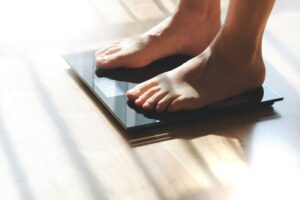
The Centers for Disease Control and Prevention estimate that around 41% of adults in the U.S. are obese. It is also estimated that around 22 million people in this country have sleep apnea. At first, these two conditions might seem unrelated, but there is actually a strong connection between them! This blog post explores how they are linked. It also provides tips that might help you enjoy improved health.
Extra Body Fat Can Cause Sleep Problems
Obstructive sleep apnea (OSA) is a disorder that occurs when tissues in the upper airway, such as the palate or tongue, block the free flow of oxygen. As a result, you may stop breathing dozens or even hundreds of times in a single night. The quality of your nightly sleep could greatly suffer.
Sadly, extra body fat, especially when it is around the neck or abdomen, can put pressure on the airway. Therefore, it increases the risk of OSA.
Poor Sleep Contributes to Unwanted Weight Gain
While weight gain could decrease the quality of your sleep, the reverse is also true. Poor sleep might cause you to gain weight! If you have sleep apnea, your body is not getting the rejuvenating rest it needs. Some of your systems, including your endocrine system, may not work properly. The hormones that control hunger and satiety may be out of whack, which can lead to increased cravings for sugary and starchy foods.
Poor quality sleep can contribute to weight gain in at least one other way. If you are constantly exhausted, you may not have the energy you need to stay physically active throughout each day.
Breaking Free of the Vicious Cycle
OSA and weight gain can create a vicious cycle. Fortunately, there are steps you can take to improve your health! Here are some suggestions:
- Seek sleep apnea treatment. Your doctor can arrange for you to undergo a sleep test. Afterward, you may be eligible for multiple treatment options.
- Change your sleeping position. Sleeping at a slight incline or on your side may reduce breathing problems during sleep.
- Watch your alcohol and caffeine intake. These substances can make breathing problems during sleep more likely.
- Design a reasonable weight loss plan. Avoid extreme diets that will not be sustainable in the long-term. Often, losing a modest amount of weight is enough to enjoy better sleep.
- Stay active. Even if you struggle to lose weight, engaging in physical activity may improve the quality of your sleep. If you are currently sedentary, something as simple as a short walk every day can be hugely beneficial.
Weight gain and sleep apnea often go hand in hand. Talk to your medical team to find out how you can find freedom from these issues.
Meet the Practice
The three dentists at Exceptional Dentistry in Aspen Hill, MD, are proud to offer sleep apnea treatment for our community. With the use of a simple oral appliance, you may soon be on your way to improved rest and better overall health! If you would like to learn more about this service and how it may benefit you, contact our friendly team at 301-460-3331.
